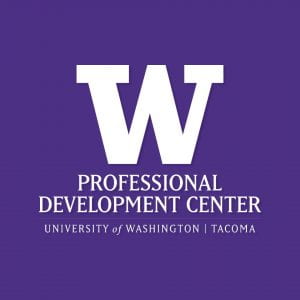[Meet the Instructors is a series intended to introduce you to one of the greatest resources the University of Washington Tacoma Professional Development Center has to offer: its diverse team of veteran, industry-tested professionals. The Center’s professional development programs are designed to be rewarding, challenging and cutting-edge. Our instructors play no small part in that, ensuring students are exposed to the most current industry trends while remaining well-versed in the tried-and-true best practices of their professions. We’re excited to share our instructors with you, and their stories are a great place to start.]
It comes as no surprise that Project Management has long been one of our most popular courses at the Professional Development Center. Across industries, project management continues to be a skill in-demand and invaluable. This summer, the PDC is expanding Project Management to Tukwila. This course gives us a chance not only to bring an exciting opportunity to lifelong learners in King County, but also additionally to introduce students to a new instructor, Angel Latterell. Currently working as a Senior Project Manager for Seattle Children’s, Latterell is a practitioner with what seems like more than one career’s worth of lessons to share. We talked with her recently to see what students can expect from her and the program.
Could you tell us a bit about yourself?
I am a woman of many hats. I love to write, travel, cook, eat, meditate, teach and explore new things in all aspects of life. I have explored careers in law, worked in non-profits, environmental and political movements, healthcare and pediatric research. I studied archaeology, world history, poetry, and metaphysics. I am dedicated to making the world a better place through service via empowering individuals to be their best selves – whether that be individuals on my project teams, my clients, or strangers I meet on the street. Each of us have a purpose in this world, and as we find that purpose, act in alignment with that purpose, we find true joy and satisfaction in life. If we have joy we are able to spread that joy to our families and communities. One of my mentors in life, Daisaku Ikeda says, and I paraphrase, “The revolution of a single individual has the possibility to change the world.” I truly believe that and act in accordance with it every day.
You have extensive experience and credentials – of all the things you could be doing, why does teaching appeal to you?
I love teaching because I enjoy being of service to others. All of my combined experience as an attorney, project manager and coach can be combined as a teacher to allow my students to gain access to tools that can empower them in their careers and lives. Project management skills are actually universally applicable on the job and at home – being a good project manager also makes you a more effective person in life. It gives you practical skills to accomplish more and reach new heights personally and professionally. One of my greatest rewards in life is to see the light in someone’s eyes when they have a new revelation as to how something works or can be applied. Seeing that spark makes every moment spent teaching worth more than anything else I could ever do.
What value do you think your professional experience brings to the classroom?
Project management is learned by doing. At some point, it is important to study the theory. However, theory separated from practical application is useless – especially with such a hands-on toolkit and set of skills as those of the project manager. My wide professional experience allows me to assist students in practicing theory in the classroom in a practical, approachable and applicable way such that they will gain the insights they need to really integrate the tools into their personal and professional habits. I’ve also been teaching project management as long as I’ve been doing it. My mentees have gone on to become leaders in software, healthcare and process improvement industries – and those who are not leaders for companies are entrepreneurs and leaders in the community.
Who should take this class?
Anyone who wants to lead projects, anyone who is a team member on projects, anyone tasked with leading small to large projects officially or unofficially, voluntarily or involuntarily. Anyone who wants to improve their efficacy at work and in life. Project management thinking is not just for the day job – it is for everything you do from DIY projects to starting a business or implementing a strategic plan. My approach to teaching will give anyone valuable tools to better plan and implement endeavors at work and beyond.
Last but not least, I’d like to say that this class is especially for anyone who wants to challenge whether or not there is enough time, money or energy to accomplish everything they want in life or at work. Project management is not a magic pill that will solve all of your problems, but it is amazing how much more time, money and energy can be generated or saved with a few ounces of planning and the consistent application of a few simple tools and communication best practices.
Why should someone learn project management?
Project management is a foundational skill for anyone who works in any business sector of the world. It is an international language that involves critical thinking, planning, risk management and strategy. Understanding the tenants of project management and having the ability to apply them to any industry increases your efficacy as individual, a team member, an employee and a leader. No one loses by learning project management. In fact, everyone gains.
What is something surprising about project management – tell us something we don’t know!
If you have read the rest of this interview it is no longer a surprise – but project management is a highly useful life skill that you can apply outside of your job. If you learn how to be a good project manager you learn effective communication skills, leadership skills, planning skills, motivation skills, and how to live in integrity and stick to agreements. These are all skills that make individuals extremely effective and successful in life.
In your opinion, what is the most important principle of project management?
Planning. Planning. Planning. Planning. Most projects fail because of lack of time spent in planning. No idea has come into the physical without planning. Project management is really the science of planning, and successful project managers spend 40% to 60% of the time on successful projects in the act of planning.
The most important tool for someone managing projects?
Hands down, the project charter and the responsibility assignment matrix (aka RACI) are the most important tools for any project manager. If you do not have a project charter, you do not have agreement on what is in and out and of scope for the project. Thus, you do not have an actual project – as there is no definition of what the project even is. Further, if you do not have someone assigned as accountable to the project, or resources who know they are responsible to complete the work – it is going to be very hard to accomplish any endeavor even with the most stunning leadership skills in the world. Agreement and accountability are key to the success of any endeavor. The project charter and the RACI are the tools that represent, hold, and help the project manager reach a place of agreement and accountability. Thus, they are the most important.
Can you tell us about any notable/challenging projects you’ve worked on?
Last year I had the opportunity, as part of a marketing initiative to draw attention to the innovative science of Seattle Children’s Research Institute working to find a cure to childhood cancers, to project manage a groundbreaking celebration for our newest research building – Building Cure. Along with the groundbreaking event, we staged a Guinness World Record attempt for the most individuals simultaneously completing a DNA isolation experiment. We invited elementary and middle schools, government officials, community members and artists to the groundbreaking celebration and had the capacity for up to 400 to participate in the world record attempt. The project was complex because we had nine weeks to plan and execute a large out-of-the-box event with a complex mini-event within it. On top of it all, it was February in Seattle, and multiple different deliverables needed to be complete and installed the day of. At the end of the day, we were 100% successful with attendance over 1,500 at the event. Also, we set a world record for the “most people conducting a DNA isolation experiment simultaneously” with over 300 participants. Meanwhile, Seattle Children’s pediatric cancer immunotherapy trials for Acute Lymphoblastic Leukemia are having phenomenal success rates.
View the course page to learn more and register for Angel’s upcoming Project Management Course!


2 thoughts on “Meet the Instructors: Angel Latterell, Project Management”
My name is Britt Harris, and I am a teacher at Shorewood High School in the Shoreline School District. I also run the ASB which includes our Leadership class. We are in the process of articulating a new course through OSPI for project management which we think is a better fit for what our students are learning and producing.
Here is my question, would you and/or the school allow me to “AUDIT” this course so I can see what a project management class looks like at the college level?
Not sure if it makes a difference, but I am a UW grad – MANY years ago. 🙂
Britt Harris
Hi Britt! Unfortunately, as a non-credit self supporting unit, our programs aren’t eligible for audits. If you have questions about the curriculum, we’d be happy to talk with you! You can send an email to uwtpdc@uw.edu.
uwtpdc
Comments are closed.